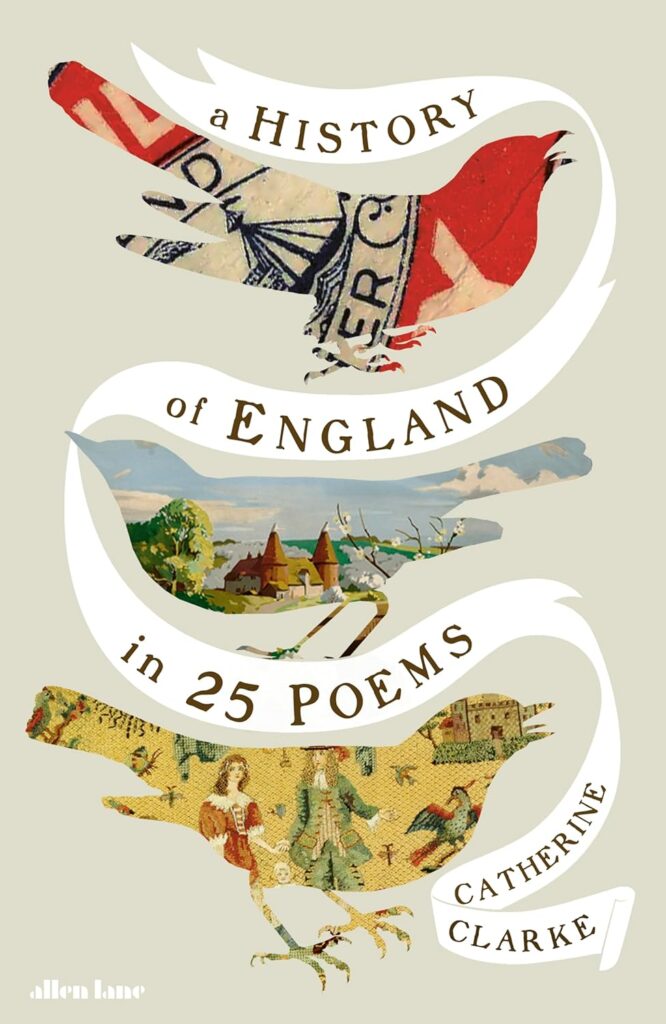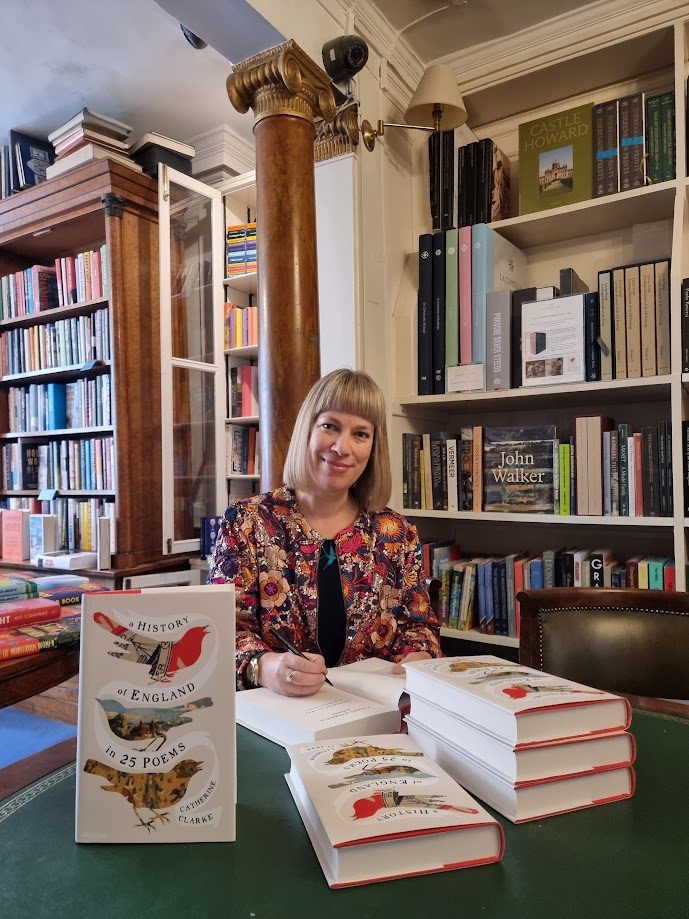A History of England in 25 Poems
Description
This new book from IHR Professor Catherine Clarke explores the history of England in new ways—drawing on her work here in the Institute.
<figure class="wp-block-image size-large">
 </figure>
</figure>It’s been quite a journey. From hours in the archive to writing and revisions, from my desk at work and home to sitting behind the microphone in a recording studio and at the BBC, from translating medieval texts to discussing artwork with an illustrator… Now, in September 2025, my new book, A History of England in 25 Poems, is published with Penguin Allen Lane. The book tells a story about how England has been shaped over the centuries—and, between the lines, I think it tells a story about so much of my working life here at the IHR, too.
My book tells the history of England in a new way. It takes 25 poems, written between the eighth century and the present day, and uses them as portals into the nation’s past. The poem Queen Victoria read after the death of Albert, which tries to make sense of new scientific knowledge alongside religious faith and consolation. Guerrilla poetry written in English after 1066, holding William the Conqueror to account. Verse which takes us below stairs in an eighteenth-century country house—penned by a housemaid dismissed for scribbling when she should have been turning the spit. Summer birdsong at a deserted railway station and the ghosts of the Great War. The wheels of Victorian industry and a tragedy in a coal mine. Voices from inside a medieval pandemic and the lived experience of the Black Death. A box of matches and the 1984-5 Miners’ Strike. Each poem opens a doorway into the past, revealing England’s history in new and often surprising ways. Poetry doesn’t just take us into the events of history, but into the experiences, emotions, and imaginations of those who lived and breathed through it.
<figure class="wp-block-image size-large">
 <figcaption class="wp-element-caption">Catherine recording at the BBC</figcaption></figure>
<figcaption class="wp-element-caption">Catherine recording at the BBC</figcaption></figure>And, of course, this is a book in search of England: how that familiar imaginary of a ‘green and pleasant land’ has been shaped through verse; the way poetry forges and troubles ideas of the nation across the centuries. Who gets to speak for England? What is Englishness? Writing this book, I’ve aimed to include diverse voices and perspectives, and I’m more conscious than ever that England and Englishness have always been complicated, colourful, and contested.
At the IHR, I spend lots of time in search of England… As Director of the Centre for the History of People, Place and Community, one of my roles is as Director of the Victoria County History of England (VCH)—a project founded in 1899 (and dedicated to Queen Victoria, which is how it gets its name), which aims to write the history of every place in England, from the very earliest times to the present. It’s still going strong, working in communities across the country and producing our iconic, authoritative books of history.
Does being Director of the VCH give me the definitive answers when it comes to thinking about English history, and what England might be? No! But, together with all our collaborators and contributors, in the IHR and across the country, I think it’s helped me form useful, precise questions. And, especially, the VCH reminds me that Englishness never begins with the grand narratives of nationhood, but at a much smaller scale. VCH history always starts at the level of the parish—the smallest unit of settlement—and builds up our picture of England from there. I’ve found that poetry, too, allows us to make these mediations between different kinds of scale: between the specificity of a single historical moment and the intimacy of direct human experience, and those big stories of nation.
Having an academic home in the IHR and the School of Advanced Study (SAS) has directly shaped so much of the book, from research in the special collections of Senate House Library, to the unparalleled resources and expert advice of the IHR Wohl Library and team, to the insights, generosity, and guidance of colleagues. The book brings together my two disciplinary areas of expertise, as a professor of history and of English Literature (I was formerly Professor of English Literature at the University of Southampton, and remain a Visiting Professor there). As an environment which champions and nurtures interdisciplinarity, SAS has been the perfect context in which to grow this book project. And, when an early reader commented on social media that the book was ‘a beacon for the importance of the Humanities’, I couldn’t have been more proud that it reflects our distinctive, privileged mission here to serve and celebrate the value of the Humanities in the world today.
<figure class="wp-block-image size-full">
 <figcaption class="wp-element-caption">Catherine visiting a bookshop</figcaption></figure>
<figcaption class="wp-element-caption">Catherine visiting a bookshop</figcaption></figure>So far, this book has opened up lots of new opportunities for me to share the historical research I’m so passionate about—and lots of opportunities for me to learn, too. I recorded the audiobook (and learned about the crucial importance of hot honey and lemon) as well as the version for Radio 4 Book of the Week. I’ve made my first visits to festivals and am looking forward to events and trips around the country—in some cases, hosted by VCH colleagues in their own places. I’ve enjoyed sharing some of what I’ve learned through the IHR’s ‘Non-Fiction Trade Publishing’ initiative—as well as gaining insights from experts myself. What I love most about my job at the IHR is the opportunity to communicate with different kinds of historians, in different settings, every day. My new book gives me another way into doing that, which is a privilege and a huge pleasure.
I’ve been really pleased to see the reception so far. If you read the book, please get in touch and let me know what you think. I don’t want the book to be an end point or last word, but the start of a conversation. How would you tell the history of England? What poems—or other sources—would you pick? What historical moments would you be sure to include? What places would you go to? The best history is always a work in progress, as any contributor to the Victoria County History will tell you. I’m looking forward to hearing your responses and perspectives over the coming months.
<figure class="wp-block-image size-large">
 <figcaption class="wp-element-caption">A first edition of Dryden’s Annus Mirabilis, held in Senate House Library, used in Catherine’s research</figcaption></figure>
<figcaption class="wp-element-caption">A first edition of Dryden’s Annus Mirabilis, held in Senate House Library, used in Catherine’s research</figcaption></figure>Professor Catherine Clarke is Director of the Centre for the History of People, Place and Community at the IHR, and is also Director of the Victoria County History of England.
Catherine is a cultural historian specialising in the Middle Ages, but she also works across a broad range of periods on questions of place, identity, heritage and uses of the past. She has published widely and gives frequent guest lectures and presentations.
The post A History of England in 25 Poems appeared first on On History.





